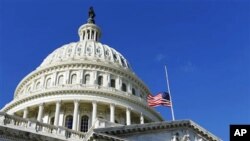After one of the most productive post-election legislative sessions in U.S. history, Americans are waiting to see whether the new Congress finds bipartisan common ground or reverts to the bickering and obstructionism that has hampered Washington’s ability to address pressing issues.
Partisan battle lines have been drawn over the new Republican House majority’s pledge to repeal President Barack Obama’s health care reform initiative. Other battles loom over federal spending, government debt, benefits for retirees, energy policy and immigration reform - to name but a few.
Amid Washington’s chronic political discord, legislation to address national priorities often is stymied. With neither party able to fully enact its agenda or willing to compromise on core principles, gridlock ensues. In the Senate, more procedural motions to block legislation have been mounted in the last two years than in the 19th and 20th centuries combined.
Political analyst Norman Ornstein said, "I’ve been in Washington for 41 years, immersed in politics of Congress, and I have never seen it this bad."
President Obama came to the White House promising to forge consensus and change Washington’s often-toxic political tone. But most of his legislative victories have come despite near-unanimous Republican opposition, accompanied by some of the most-heated rhetoric seen in decades.
With the arrival of a new Congress, there are fresh calls for change. Democratic Senator John Kerry of Massachusetts said, "The world of the next generation will change too rapidly for political parties to focus too narrowly on the next election. And the 21st Century can be another American century, but only if we restore a larger sense of responsibility and replace the clattering cacophony of the perpetual [political] campaign with a wider discussion of what is best for our country."
Last year’s post-election congressional session provided a glimmer of hope. Democrats and Republicans found middle ground on contentious fiscal matters and enacted a tax bill that was palatable to both parties. Congress went on to pass many other bills, often with at least token Republican support.
"What we can't do is refight the battles of the past two years, that distract us from the hard work of moving our economy forward," said Obama.
But Republicans in the House of Representatives say they have a mandate from voters to halt or reverse the Obama agenda, including repealing the president’s signature health care reform law. Republican Representative Fred Upton of Michigan said, "We are going to be taking this bill apart piece by piece until it falls."
Not so fast, said Senate Majority Leader Harry Reid. "The Republicans have to understand that the health care bill is not going to be repealed."
It remains to be seen whether the near-fatal shooting of Arizona Congresswoman Gabrielle Giffords has a lasting impact on the nation’s political discourse - whether it calms tempers and rhetoric, allowing greater space for compromise. For now, the incident seems to have fostered a sense of unity among members of Congress.
House Speaker John Boehner said, "An attack on one who serves is an attack on all who serve. Such acts have no place in our society."
In the wake of the Arizona tragedy, the House postponed legislative business, including a repeal vote on health care.













